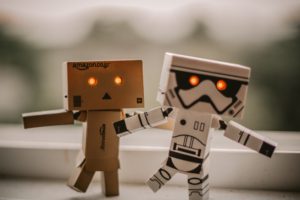[social_warfare]

As a species, we are fascinated by living machines. We revere and fear it. Think of all of the movies and TV shows that are based upon this premise. Terminator, Star Trek, Bladerunner, A.I. We love the robot characters that look human but totally unencumbered by our pesky emotions.
We want our homes to be automated and responsive. We want smart speakers, watches and thermostats. Yet we wring our hands at tireless robots taking our jobs. As a reaction, we are on-call at work 24/7s just as a machine would be. Have a cold? Forget rest, take enough drugs so you can go to work.

So we have come to idealize ourselves as machines. We expect ourselves to function perfectly all the time. If we are sick either physically or mentally, we are viewed as a machine with broken parts.
But what if we had been approaching this all wrong?
Design Flaw or Feature?
We subscribe to a type of technochauvism in which we believe machines superior in all facets of doing. We look to technology to solve our problems believing solutions that involve tech will be better than those involving human judgement.
We view our emotions to be a hindrance to our day to day lives. We treat it as a design flaw. Remember in Star Trek when Data got his emotion chip in one of the Star Trek movies? If you don’t, I’ll spoil it for you, he runs amok. He’s overcome with fear or anger and his actions a slave to his emotions.
Ghost in the Machine
Maybe this viewpoint has its start going back to Henry Ford and his assembly line. On the line, each person is designated to perform one action as part of a whole and thereby increase efficiency and reduce error rates. we became part of a greater machine. This created a compensation structure that exists in many manufacturing plants still; a carrot for increased units produced with the fewest quality assurance issues.
Even if you work an office job like me, you may still, jokingly, refer to yourself as just a cog in the machine. Again, we deny our human parts and identify with the machine.
There is Nothing Either Good or Bad, But Thinking Makes it So
Somewhere along the way, we got the notion that having emotions is a bad thing. And if we had to have emotions at all, some are acceptable to have (like joy & happiness) and some are completely unacceptable (like anger, jealousy or sadness).
You never hear anyone say “oh, you are so emotional” as a compliment. It’s usually said in a very dismissive way, especially if you are having the feels. The phrase implies: oh just get over it already.
In fact, if you believe in evolution at all, then you’d have to think that having emotions are actually to our advantage. Otherwise, hundreds of thousands of years of evolution would have selected out the need for emotions. We’d all be the equivalent of Spock already. So the reason we have not evolved out of emotions means they are here to help us.
Feelings are a good thing.
Emotional Superpower
Pixar’s movie, Inside Out, brilliantly and entertainingly shows all of our base emotions and each has a purpose to serve. We also see that sadness or anger are not bad emotions that need to repress.
Our emotions help us make us who we are, our mental models and frameworks. They help us make sense of our world and help us make decisions in our world.
I know, that sounds crazy. We always hear that we need to take emotions out of decision making. Especially if those decisions are about money.
Machine Thinking
This has led to many misconceptions around money. The “rational investor” assumes that we can remove emotion. It assumes that everyone else can as well. It assumes that all emotions are bad. Or at least having them will automatically lead us to make bad decisions.
These misconceptions bias most personal finance advice. Though well-meaning, financial bloggers, personal finance experts espouse advice that is too mechanistic; simple if: then statements. If you don’t “need” it, then don’t buy it.
Sticking to a budget is easier said than done. We know this from experience. When we screw up, we beat ourselves up. We see our inability for perfection as a weakness. We look to “fix” ourselves; unconsciously, we are thinking there must be a bug in our programming.
Bad Code
If we take this analogy further, our basic functioning can be viewed as an operating system. We can be running Windows or Linux or whatever. The budget then becomes an application.
We see that this budget app keeps crashing and so we dig into our OS to see where the bug is. We keep trying to rewrite bits of “bad code”.
In this case, we rarely look at the application itself. The budget app isn’t bad. Budgets can be a helpful and productive application. But maybe this app was written to run on a Mac and not Windows (it works for some and not others). Or it’s the app that has a piece of bad code (based on the assumption of perfection rationality).
Instead of scraping the app altogether, we can adapt it to work with our OS. We can re-write the app to take into account the emotional reactions we have to our environment.
Investing 2.0
Someone who has embraced humanity in humans is Warren Buffet. He does not assume that people are perfectly rational. He accepts that investors are just humans and they have all the feels.
He tells us to “be fearful when others are greedy and be greedy when others are fearful”. Both fear and greed are emotions. He doesn’t say, don’t have emotions or don’t make financial decisions based upon emotions. If you read his quote closely, he’s telling you to have a feeling and then act upon it.
What to do Instead
So banish the idea that you are a machine with broken parts. The feelings you have are what make your operation system function to its highest capacity. Think the Tin Man in the Wizard of Oz, he is complete when he is imbued with a heart. Even in the later story of Star Trek, in a scene where Data is reunited with his pet cat, he is happy, yet sheds tears. He thinks he’s still malfunctioning, but we all know that his emotion chip is finally working as it should be.

Instead of denying your feelings, learn to live in harmony with them and master their effect on your life and behaviour. Next week, I share some tips from Harvard Psychologist on how to do just that.


We even take the emotion out by hiring “roboadvisors” to help us invest! Great observations. I think Warren Buffett is definitely a sympathetic investor, too.
Exactly! I have nothing against “roboadvisors”, but I think of them more as “automatic” instead of the non-feeling “robo” that many associate with it.
Pingback: How to an Emotional Investor and Not Lose Your Shirt - SundayBrunchCafe
Pingback: Women’s Personal Finance Wednesdays: Week 56 Roundup - Tread Lightly, Retire Early
Omg, I am so here for the Star Trek analogies!!!
Pingback: Top 10 Personal Finance Articles of the Month — October 2019
Pingback: Self-Sabotage and How to Overcome the Self-Limiting Beliefs Standing Between You and Success - Sunday Brunch Cafe
Good work! this article resonates with me. Part of dealing with the roller coaster of the market and emotions associated is to ask yourself does it matter in the long run? and do you still believe in your investment thesis?